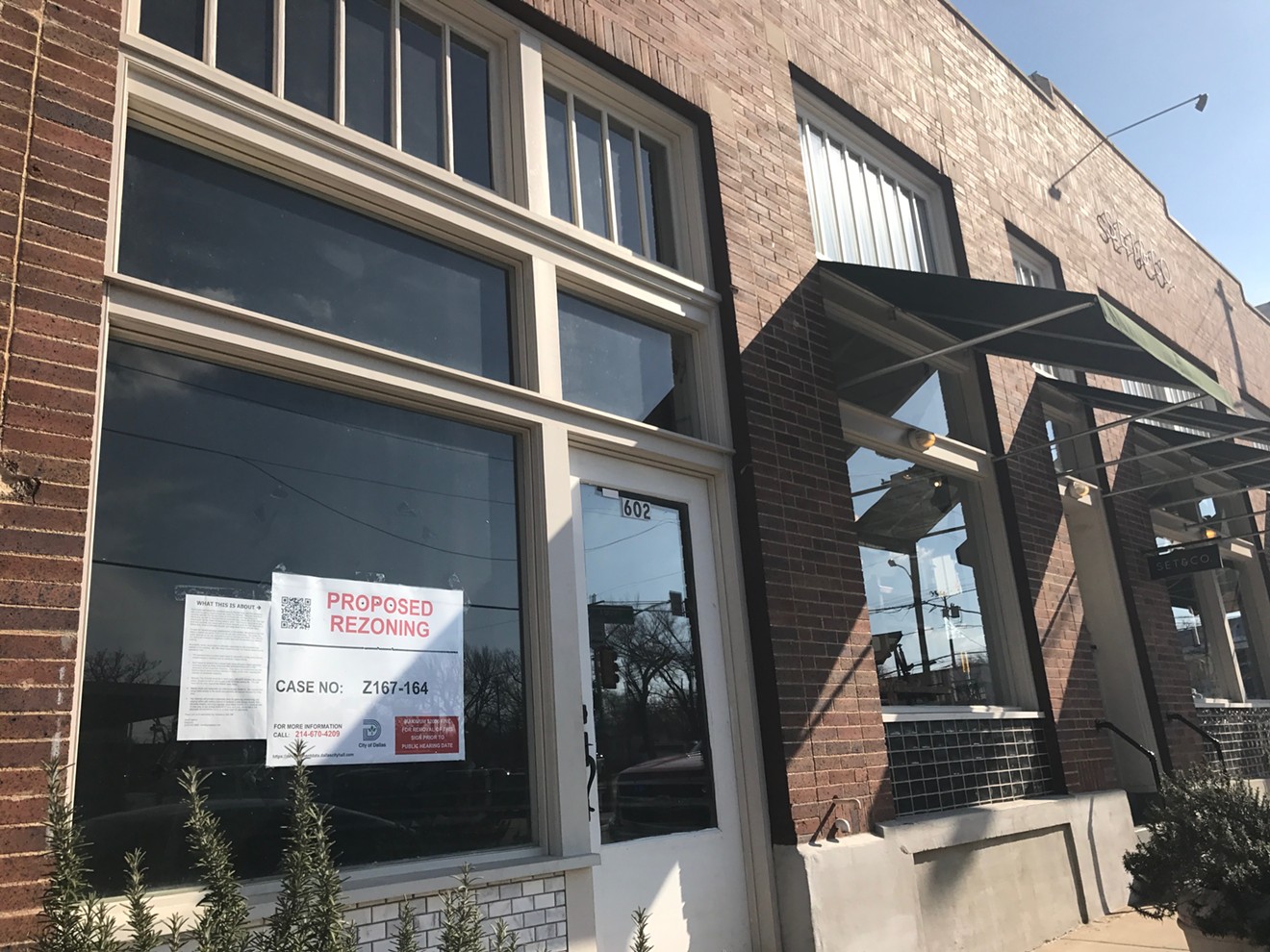In anticipation, I sent questionnaires to the nine candidates to be Dallas’ next mayor. Turnout was only a little bit better than an actual municipal election’s. I couldn’t reach Socialist candidate Alyson Kennedy, and the campaigns of Mike Ablon, Eric Johnson and Jason Villalba ignored multiple requests for comment.
Below, though, you’ll find answers from Albert Black, Scott Griggs, Lynn McBee, Regina Montoya and Miguel Solis to nine questions, ranging from the minimum wage to minimum parking requirements and from tourism to food deserts. I’m printing the candidates’ answers alphabetically, and we edited them only to correct typos. I won’t editorialize or add commentary.
Read on, and see where these five potential mayors stand on food and food industry issues.
Dallas bars and restaurants are required to provide a certain number of parking spaces per seat. Are these minimum parking requirements beneficial overall, and do you advocate any change to rules?
Albert Black: I would be open to a review based on the increased use of ride-sharing, especially because encouraging the use of ride-sharing companies when drinking is involved is good policy. That said, we need to be careful not to drive parking into surrounding neighborhoods.
Scott Griggs: Minimum parking requirements make sense in locations with restaurant and single family residential adjacency. In areas without residential adjacency, such as some more urban areas, there should be more flexibility in parking requirements or the elimination of parking requirements.
Lynn McBee: I do not think we should be requiring bars and restaurants to provide parking.
Regina Montoya: I think adequate parking is important, and also accessibility for handicapped and disabled customers. I’d like to investigate how much parking is necessary given increasing use of ride-share services in busy entertainment districts, as well as the impact of walkability in certain areas. Our solutions should fit the situation rather than being cookie-cutter.
Miguel Solis: Parking requirements shouldn’t be broad-based – certain businesses, especially those that are local, might need less parking than large restaurants, so the creation of a context-based parking board would be helpful to determine what parking requirements should be.
At the same time, we need a mayor who will focus on transitioning the city from a commuter-based transportation plan to a multi-modal, walkable plan that helps relieve us from the archaic planning we have traditionally taken. Focusing on increasing parking promotes the old ways of doing things, and we should get creative about transportation moving forward.

Stirr's panoramic view of downtown is the perfect backdrop for selfies. It's also the kind of rooftop bar that has come under criticism from neighbors for noise.
courtesy Stirr
Albert Black: As with any public policy, it does require a balance, but my preference will always tilt toward keeping the neighborhood stable, attractive, sustainable, safe and secure for its residents.
Scott Griggs: Late-night bars and restaurants can exist among neighborhoods. To do this, we can restrict outdoor music after a certain time of night. Noise and commotion increase the bigger the establishment is. One example of this succeeding is Tiny Victories, for which I voted on granting a late-night permit. There are limitations on outdoor music and lighting, and it’s an establishment that is small and among a mix of retail spaces. Preventing rooftop decks is also a necessity in keeping the space livable, as such structures help sound carry.
Lynn McBee: We must protect our neighborhoods. Bars and restaurants located in or around neighborhoods should be held to a higher standard, and should be required to re-permit more frequently, giving neighborhoods the ability to hold bad actors accountable. If there are issues between permit approvals, there should be a process in place to revoke permits.
Regina Montoya: I think we need to respect the quality of life of residents who live near bar and restaurant districts. Too many 311 calls are falling through the cracks. We need a better system to ensure we are meeting the needs of both the establishment and residents. The city has a lot of character because of places like Bishop Arts and Greenville Avenue because of the proximity of neighborhoods and retail, restaurants and bars. We need to make the investment of time and problem-solving to keep these areas vibrant while respecting nearby residents.
Miguel Solis: Instead of creating bar or restaurant curfews, known in the old proposal as special use permits, or SUPs, City Hall should work to enforce the noise ordinances that already exist. Oftentimes, bars and restaurants that are greatly impacted by curfew restrictions are frequented or owned by minority communities. We should work to make these policies more inclusive and to enforce the ample regulations that are already in existence, rather than enacting policies that can be harmful to small-business owners. The answer is in not making restaurants pay for SUPs and risk losing potential investment/development in the area.
Would you support or oppose a law requiring food service establishments to publicly post their health inspection score in a door or window, similar to New York City’s grades or the United Kingdom’s “Scores on the Doors”?
Albert Black: I would support this proposal. I understand the discomfort it might cause restaurant owners, but the information is relevant to customers being able to make informed choices. And making the information more accessible to the public would create another incentive for owners to ensure their facilities meet health standards.
Scott Griggs: Yes. Posting a health inspection score is an act of transparency, for both the city and the establishment.
Lynn McBee: I support posting health inspection scores that deliver transparency to Dallas diners and customers and allow them to make informed choices.
Regina Montoya: I am sensitive to avoiding undue red tape that could hinder the restaurant industry, but I do think customers should have access to inspection scores. I am positive there is a workable solution that makes sense for our Dallas food service establishments.
Miguel Solis: Yes, scores should be posted outside so consumers can know immediately the level of cleanliness at a restaurant. However, to truly make this a helpful service to the public, Dallas city health codes and scoring systems need to be better explained to Dallasites. City Hall should simplify the system so average people can quickly determine whether a restaurant has had food safety violations.
City Council recently decreased the fine for a restaurant that fails its health inspection from $380 to $71. The goal of the change is to support the growth of small businesses. Critics say the change has reduced the incentive of kitchens to stay clean, and the incentive for Dallas to conduct thorough inspections. What course would you suggest with this fine?
Albert Black: I would support a graduated fine that decreases as the health score increases.
Scott Griggs: I do not support excessive fines. The purpose of the food inspection program is to ensure food safety and correct the behavior of food establishments that aren’t meeting the high standards of the public. To achieve this goal and hold restaurants accountable — while keeping the lower health inspection fee — a practice such as posting the health inspection score (“Scores on the Doors”) should be implemented.
Lynn McBee: The higher fine would be a greater motivator for cleanliness and protecting the health of diners, so I would support increasing it.
Regina Montoya: I understand the concern with decreasing the fine. The City Council took a minor step in addressing our food inspection system, but I would like more transparency on follow-up visits, which often occur late or maybe not even at all.
Miguel Solis: Inspection policy should be fair to businesses, but should not come at the cost of consumer protection. Costs to business can be avoided if the city invests in better technology for inspectors and preventative training programs to help restaurants stay up to code. The city of Dallas should raise the fine and work to invest in creating a simple health and safety course for all new staff that is hired. The city must put the public’s safety first.
A bill filed in the Texas Legislature would allow cities to set a minimum wage higher than the statewide minimum wage of $7.25/hour. Would you support this bill?
Albert Black: If it’s a statewide proposition that does not pit Dallas and businesses against its neighboring cities, I’d support letting voters make these decisions. The proposition should apply to our regional and statewide competitors as well.
Scott Griggs: Yes.
Lynn McBee: I support local control.
Regina Montoya: I believe that local governments should be able to freely govern local matters.
Miguel Solis: Yes, it is crucial that Dallas promote a livable wage for its employees. While serving on the school board, I successfully raised the pay of DISD employees and hope to do the same for city workers.
If the legislation passed, would you support a change to Dallas’ minimum wage? What about tipped minimum wage?
Albert Black: We need to have a conversation about what wage is appropriate. I do not believe $7.25 is a wage you can support a family on. At my business, our lowest paid employee makes $13/hour with an average pay for baseline employees well over $15/hour. But, I understand many small businesses might not be able to afford that. I am also concerned about putting our businesses at a competitive disadvantage.
Scott Griggs: Yes. As an initial step, we need to raise all wages to a livable wage as expressed by the MIT Living Wage Calculator. Of course, tips need to be taken into account. As a second step, we need to move to $15 per hour.
Lynn McBee: It would depend on the new proposed wage.
Regina Montoya: I support raising the minimum wage in order to increase our median incomes, and it’s clear that the current minimum wage is too low for many people who are struggling to make ends meet.
Ideally, I’d want an increase to be created at the federal level because a global change is better for economic dynamics in a competitive market economy. But I am not necessarily interested in waiting for the federal government to make the change. Ultimately I think it’s a boost to the economy if people have more money to spend to cover expenses and have expendable income. I would want to get input from all sides of the issue, from employees who are struggling, from economic experts and from business owners. We need a solution that helps people make ends meet and also allows our economy to succeed.
Miguel Solis: I have supported increases in the minimum wage so workers are compensated fairly as discussed above. But it is important that we bring all stakeholders to the table when we are entertaining this change. The biggest issue of the current council is that those who would support a change to wages have oftentimes found themselves fighting against the business community rather than engaging them in helping craft a workable solution. As mayor, I would seek to find common ground in getting us to a wage that helps the thousands of Dallasites currently impoverished, many who are working poor, while ensuring businesses can grow to support the change.

Daron Babcock, founder of Bonton Farms, stands in front of "the big farm," where he grows and sells produce to his South Dallas neighborhood and also to Dallas chefs.
Taylor Adams
Albert Black: In addition to offering incentives to large grocery chains to build new stores, we should look at getting fresh food into existing smaller stores and markets to expand choices for residents. In addition to some level of subsidy/incentive, this effort would require a local public education campaign operating in tandem.
I have proposed creating health enterprise zones that would attract health care facilities to a community while providing good middle-class jobs for neighbors (think med techs) and infrastructure investment such as better streets, sidewalks and lighting. The Baylor Diabetes and Wellness Center that I helped bring to the South Dallas neighborhood where I grew up is a good example of this in real time.
I believe we could use these health enterprise zones to incentivize small markets to establish a footprint in food/health care deserts — especially those markets, large or small, that commit to not selling their products at a higher price in the southern sector than in other parts of Dallas. We also need greater access to internet service in order for seniors and their families to have the option to order groceries from home. Imagine having the option to order food at local market hubs that you can walk to. (It can take hours on DART to travel around to grocery stores in blighted communities.)
Scott Griggs: The USDA defines a food desert as a low-income area with low access to vehicles and no grocers within one mile. To combat food deserts, the city of Dallas has aggressively tried to attract for-profit grocers to these areas with financial incentives and has enacted community garden and farmers market ordinances that allow for sales of locally grown and produced food and alternative growing methods.
Despite efforts such as these, we continue to have food deserts. One potential solution is a nonprofit grocer to operate in a food desert. The city of Dallas should financially support this nonprofit effort and see if this can be a blueprint to create more grocery stores in food deserts.
In areas where we have not been able to bring a grocer to a food desert, we need to have public transportation from food deserts to grocery stores. To accomplish this, the city of Dallas must quickly enact a transportation policy with expectations for DART requiring such service, without unnecessary passenger waits or transfers.
Lynn McBee: We must take a short-term and long-term approach to tackling food deserts. In the short term, we must create community-driven solutions that provide healthy food options in accessible locations within these communities. For the long term, we must deliver sustainable grocery stores and market options in southern Dallas. Success in this area will also require educating citizens on nutrition and how to make healthy food choices, which should be addressed in our schools.
Regina Montoya: First the mayor and the council person for any district that suffers from lack of a grocery store must proactively reach out to the industry to encourage opening of new stores. We can also investigate alternative options like neighborhood food co-ops. We have to address the problem in context also. Food deserts are a symptom of other economic forces – lack of employment, lower median incomes, poor transportation and infrastructure, neighborhoods of concentrated poverty, lack of income to cover basic needs. We need to strengthen neighborhoods and invest in people at the same time we address access to food.
Miguel Solis: Food deserts all too frequently impact low-income residents and communities of color. The city of Dallas must work to foster inclusionary development that includes marginalized communities when developers come in. Dallas can work to further incentivize local grocers and markets to open businesses in the southern parts of Dallas through zoning initiatives.
One innovative and effective way to eradicate food deserts are public-private partnerships. By partnering with private companies and/or investors, the city can award forgivable and/or low-interest loans to fresh food retailers, ranging from supermarkets, grocers, and farmers market vendors. The mayor is well-positioned to facilitate these partnerships by encouraging socially-conscious investing and ensuring that community leaders stay involved in the process.
Finally, let’s identify other creative approaches to addressing the issue like supporting urban gardens like those in the Bonton and Mill City communities as well as Paul Quinn College. Helping these southern Dallas innovations scale can help bolster the local economy and promote healthy lifestyles as well.
Tourism boards in cities like Austin and Houston have successfully promoted those cities as “foodie” destinations, sometimes by using taxpayer money to “wine and dine” visiting press. If food tourism is an opportunity in Dallas, what role does city government play in that opportunity?
Albert Black: City government should always be a booster when it comes to attracting new businesses and new jobs to Dallas. I do not, however, support using tax dollars to “wine and dine” the press.
Scott Griggs: Ensuring that we have a well-run visitors bureau is vital to promoting Dallas as a destination for its culinary scene. The city government needs to ensure that the culinary scene as well as arts and culture is adequately promoted. The recent audit of VisitDallas, our organization tasked with tourism, shows this entity does not have sufficient mechanisms in place to provide oversight for reliable accounting. As a result, millions of taxpayer money is wasted. A good visitors bureau should be held accountable while properly promoting culinary destinations, arts and culture. The funding at VisitDallas needs to be utilized to fulfill this goal.
Lynn McBee: We already have a Tourism PID in Dallas that should be used for marketing our city and attracting tourists.
Regina Montoya: Dallas is a great food destination with amazing options from street food to the finest dining. Any marketing of the city should include a focus on our great food culture. I don’t think an extravagant amount of money should be spent on wining and dining the media. At any rate, any promotion we do with taxpayer dollars needs to be funded in an accountable and transparent way.
Miguel Solis: One thing the city could do to make food tourism an opportunity in Dallas is to simply partner with Dallas Restaurant Week and promote it as a major tourist event. We could even take it a step further by contracting with some of Dallas’s many freelance food bloggers to write for the tourism board’s Best Restaurants page in order to highlight food from all parts of the community.
What is your personal Dallas comfort food?
Albert Black: I enjoy Gonzalez Restaurant a lot, perhaps too much, and recommend it to your readers.
Scott Griggs: My favorite Dallas comfort food right now is a macaron ice cream sandwich from JOY Macarons. As a family with young kids, we enjoy walking to Nova — there are great dishes, and we can get plain noodles for the kids. Plus, they are stroller-parking-friendly.
Lynn McBee: Our city has so many great food options! Some of my favorite comfort foods are the buttered popcorn at the Inwood Theatre and any ice cream or chocolate from Kate Weiser at Trinity Groves.
Regina Montoya: Tacos. We have an amazing range of taquerias. I couldn’t name just one place I love the most. I do tend to order seafood tacos.
Miguel Solis: Of all the questions, this is the most difficult because Dallas has so many great places to eat and have fun. When it comes down to it though, nothing beats a great Dallas taco, so I would say my favorite restaurant is a tie between Tacos Mariachi in West Dallas and El Come Taco in East Dallas. Both restaurants have amazing food for a very reasonable price.












